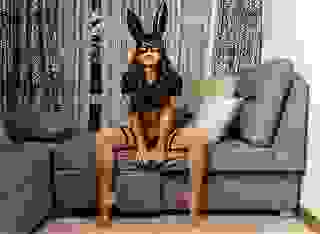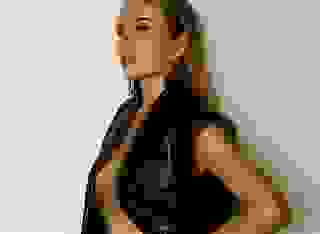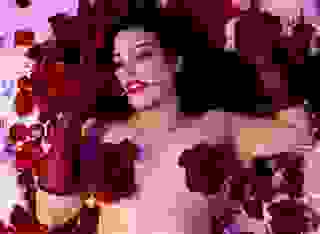Note: You can change font size, font face, and turn on dark mode by clicking the "A" icon tab in the Story Info Box.
You can temporarily switch back to a Classic Literotica® experience during our ongoing public Beta testing. Please consider leaving feedback on issues you experience or suggest improvements.
Click here"'Calm down, don't be afraid, I'm not going to hurt you. I'm a Palestinian; we don't make war against defenseless women. We are not animals like Hamas; all we want is a chance to live in peace. If you promise to behave yourself, I will cut you free from the bed. If you struggle or try to escape I will kill you. Do you understand?'" "Dina nodded her agreement to his terms.
"The other man returned with a bundle of clothes. He stood behind her, pistol in hand, as the man with the knife cut away her bonds. Dina stood and steadied herself against the wall as they helped her slip on an old woman's kaftan and a full head veil. The disguise wasn't perfect but it would have to do. They explained that they would wait until it got dark, then they would drive her to Tel Aviv. If she was cooperative she would be free and in a Jewish hospital by morning.
"When it finally got dark, she heard a car pull up behind the shop. Her newly acquired "friend" got her to her feet. 'Here take these,' he said, handing her several pills and a bottle of water. 'They're for the pain and for your own good.'"
"Reluctantly, she followed his instructions. They each supported her as they made their way across the shop floor to the back door. By the time she was ushered into the back of the car her eyes were beginning to close. Soon there was nothing but blackness. Sometime early the next morning she was unceremoniously dumped on the sidewalk in front of the Wolfsan Medical Center with a note pinned to her clothing.
"'Free Palestine, Death to the Jews. Hamas'"
Peter listened spell-bound to David's story.
David continued, "Her wounds were extensive, but not life threatening. The bones mended; the bruises faded; the burns and knife wounds closed, leaving her body covered with scars; it was her spirit that suffered the most. No longer was she an idealist fighting for the safety of the Israeli people, now she was filled with hate for the Arab and Palestinian people. She spent three months in physical therapy and another three months in psychiatric therapy. The Army declared her unfit for military service, placed her on a disability pension and encouraged her to remain at home away from the public. She was virtually under house arrest. Not that I could blame them; I've watched her work her body back into fighting shape. At nearly six feet, one hundred sixty pounds of solid muscle, she was a trained killing machine with a hair trigger temper and a need to release her pent up hostility against someone."
"My tour bus driver, an Israeli Arab, who has been with me for over ten years and is practically part of the family, he's afraid to come to the house. The doctors have told us that there is no way to predict when or what could set her off. Outside of committing her to an institution, keeping her isolated from the general public seems to be the only solution."
David, drained his glass, and stood offering his hand to Peter.
"I'm sorry to burden you with my problems. I hope you'll forgive me."
"Don't be silly," Peter said throwing his arm over the shoulder of the taller man and giving him a consoling embrace. "I'm glad you told me, sometimes a person needs to unload some of the burden he's been asked to carry. I'm honored that you chose me."
"Thank you, Peter. Get a good night's sleep; we have a long day ahead of us tomorrow. You have to check out of the hotel after breakfast. We'll make several stops along the way and by evening we'll be checking into the King David Hotel in Jerusalem. See you after breakfast, let's call it 8:30 in front of the hotel. Good night."
Chapter 4
The lobby was filled with people, all waiting to board the various tour buses parked in front of the hotel. After turning in his key, Peter pocketed his receipt, picked up his bag, and exited the hotel. David was leaning against his car, his cell phone in hand, just ending what appeared to be an animated conversation.
"Good morning Peter. Are you ready for the next phase of your tour of the Holy Land? I have a friend, another tour guide; the day after tomorrow we're going to join him and his group in the "Old City" on their procession along the Via Dolorosa to the Church of the Holy Sepulcher."
"That sounds wonderful, David. I can't wait."
"In the meantime, let's get going; we have a long trip ahead of us."
The sun was already heating up the morning. Even though it was the middle of November, the temperature was expected to be in the upper eighties.
"David, is it always this warm this late in the year?"
"No, this weather is a little unusual. We should be already in the beginning of our rainy season, with temperatures around seventy degrees. We really could use some rain. Let's hope it starts right after you leave for home," he chuckled.
After maneuvering through the morning city traffic, they headed south along the Jordan Valley Road. Their first stop was at the Jordan River. Peter was amazed at the number of tour buses in the parking lot. Large groups of pilgrims from all over the world, speaking in languages that he couldn't identify, were entering a facility that resembled a small amphitheater, with rows of concrete seating separated into sections by aluminum railings. Many of the groups were wading into the Jordan to renew their baptismal vows. Peter chose to kneel down and, sticking his hand into the water, blessed himself. He turned, walked back up the stairs and scanned the spectacle below. 'It's good to see that Christianity is alive and well and thriving in these troubled times.'
Peter met David at the entrance of the building. "So Peter, what do you think of the Jordan River?"
Getting the hint from David's voice he laughed, "I guess Pete Seeger never visited the Jordan River," he said referring to the lyrics of his version of the old African American spiritual song, made popular by the Highwaymen in the early sixties.
'The river is deep and the river is wide, hallelujah,
Meet my mother on the other side, hallelujah.'
The river was neither; being less than twenty yards wide and approximately four to five feet deep as best as Peter could tell.
They got back into the car and continued their journey south into the Judean Desert. Outside the landscape gradually changed from the lush green trees and plants of the Jordan Valley to the treeless, sparse, brown vegetation of the desert. For miles they traveled. On one side of the road, stood bare desolate mountains; on the other was a flat, treeless plain mostly covered with dried out grasses, the only sporadic greenery where the Jordan River was accessible; and in the distance, was the country of Jordan.
After about two hours of driving, they passed the city of Jericho and soon after were turning left off the highway. Before them, in the deepest part of the valley, lay the Dead Sea.
"This is the Dead Sea," David exclaimed as they left the car and walked along a concrete path through the small seaside resort. "The Dead Sea is the lowest surface on the face of the earth at over 1400 feet below sea level. The reason why it's called the Dead Sea is because nothing can live in its water. The salinity is about 34%, which makes it one of the saltiest bodies of water in the world. People have been coming here for thousands of years. The water and the mud from the sea bed are considered therapeutic."
They walked to the water's edge. Peter bent down and dipped his hand into the water.
"It feels slick, like an oil of some sort"
"That's the salinity; that's why it's so easy to float. Let's get out of the sun; we can grab a beer and watch all the tourists from the patio."
They sat, relaxing under the shade of a large umbrella, watching people - some floating, some covered head to toe in mud, all seemingly enjoying themselves - for about an hour, then returned to the car; their next stop was just a short drive to the other side of the valley.
"These are the excavated ruins of Qumran. Some scholars believe that this was the home of the sect that John the Baptist joined before he became a public figure," David said as they pulled into the parking lot in front of a small building.
They left the car and walked along a well-marked path, past several excavated rooms, cisterns, and public baths until they came to a large plaque showing how scholars believed the site looked two thousand years before.
"David, it's amazing that anyone could live in this area; it's so barren, so devoid of life."
"That's true; but remember life was so much simpler then; all they cared about was survival, not like today. Up there is the reason why this site is famous," David said pointing up at the barren mountain range in front of them. "In one of those caves is where two young boys discovered the Dead Sea Scrolls. It's believed that they were stored there by the religious inhabitants of this area for safe keeping."
Peter spent the next few minutes taking pictures of the area. Even though it was the middle of November, the sun was strong and the temperature soared into the nineties making them both rather uncomfortable.
"It's getting late; we'd better get going if we want to get to Jerusalem before dark."
They drove for about a half an hour when, just before they began to make the climb up to the City of Jerusalem, David pointed to their right saying, "That's something you don't see very often back in the States."
Looking up from his map, Peter spotted the cliché sight that David wanted him to see. They were coming up on a corner gas station/convenience store; there, tied to a light post, festooned with colorful saddles and bridles, were two camels.
They continued on their journey. After twenty more minutes of driving they merged onto a highway and began to climb.
"Is Jerusalem on the other side of this mountain?"
"No," replied David. "It's on top of this mountain; it's actually a high plateau, about twenty-five hundred feet above sea level in the Judean Mountains."
When they reached the summit, Peter could see modern high-rise apartment buildings, mixed in among older residential buildings and commercial buildings. 'This part looks just like many cities back home,' Peter thought, 'except the colors are mostly shades of white and beige.'
David drove through a residential area and soon came to a stop alongside a small park, where he parked the car. "Let's get out here; I want to show you something."
They walked across the park passing a wedding celebration. The young bride and groom were seated atop a festively-attired camel. A photographer, as well as many others in their party, was taking pictures of the happy couple.
On the other side of the park they reached a concrete retaining wall.
David stretched out his arm. "This is what I wanted to show you. That is the 'Old City'. We are standing on the Mount of Olives; between us and the Old City is the Kidron Valley. The large golden dome is the Dome of the Rock. Below us, to the right, there," David pointed, "is the Church of All Nations or the Basilica of the Agony; next to it is the Garden of Gethsemane, and directly below us is the largest Jewish cemetery in the world. We'll start our tour of the Old City from here tomorrow." Peter just stood there, stunned at the view before him.
"I think it would be best if I gave you a brief history of the city and a description of what you're going to be seeing and not seeing tomorrow. The Old City is considered holy by three major religions; Judaism, Christianity, and Islam. It's been fought over for more than five thousand years and has been completely destroyed at least twice in that period. For the Jewish people it's the sight of the First Temple, which was commissioned by King Solomon. For the Christians, it's the focal point of their religion, the site of Jesus' crucifixion and resurrection. And for the Sunni Muslims, it's the third most holy city after Mecca and Medina; it's where - in 620 AD according to the Quran - Muhammad made his night journey, ascending to heaven where he speaks with God.
"Despite it being less than a half square mile in area, the Old City is home to many sites of great religious importance; among them being the Temple Mount and its Western Wall, the Church of the Holy Sepulcher, the Dome of the Rock, the Garden Tomb, and the Al-Aqsa Mosque. You can see why so many people have fought and died over the centuries.
"From almost its inception, the city has been surrounded by defensive walls. The walls you see today are not the walls that were there at the time of Jesus; in fact, one of the few things that survive from that time is what is known the Pillar of Absalom, that large pillar with the dome on the top, over there to the left. The walls you see today were built in the early to middle 1500's AD by the Great Sultan of the Ottoman Empire when they gained control of the City. The Ottomans held the City for nearly four hundred years, until the British Army captured the City in 1917.
"The City itself is divided into four unequal quarters, and the Temple Mount. The Muslim Quarter is the largest by far, being nearly the size of the other three quarters combined. The Armenian Quarter is the smallest and the Christian and Jewish Quarters are roughly the same size. Each Quarter has its own ethnic group and customs. We'll see each of the Quarters tomorrow. I think that's enough history for today. It's getting late; I think we should go check into our hotel."
Peter stood for a while longer gazing across the valley at the golden dome; the sun was just beginning its descent behind the taller buildings in the distance beyond the Old City. He could hardly wait for tomorrow's adventure to begin.
Peter and David checked into the King David Hotel, not too far from the Old City. They had a pleasant dinner together, followed by a glass of wine in the lounge; then David said, "I think we'd better get some sleep, we have an early wakeup call and breakfast. I want to be on the road by nine. I have a big day planned for us."
Wishing each other a good night, they adjourned to their respective rooms.
Chapter 5
At breakfast the next morning, David laid out his plans for the day. By nine o'clock they were in his car heading back to the Mount of Olives. After parking, David led Peter back to their observation point from the previous day. They walked a short distance to the junction of two roads, one of which headed down the mountain at a steep angle. There were no sidewalks and the road was barely wide enough for two cars to pass one another. To their left Peter caught glimpses of the Jewish Cemetery. In some places along either side of the road, where the ground was suitable, people had built small houses and had cars parked in front of them, making the road even more congested. Occasionally a car would pass them as they continued their trek down to the valley below.
"Just think how much fun this is going to be climbing back up this road tonight."
Near the bottom of the street, David halted in front of a small iron gate covered with ivy. The simple sign above the gate read "Garden of Gethsemane." David held the gate open and allowed Peter to enter first. A cinder footpath led them through the garden, past what appeared to be ancient olive trees; their gnarled trunks were more than ten feet in diameter.
"David, were these olive trees here at the time of Christ. I've seen olive trees before, but never have I seen any with such huge trunks."
"As you know, arborists can tell how old a normal tree is by the number of growth rings it has coming off its center. You can't do that with an olive tree, their trunk is formed by shoots coming up from the root ball and twisting around one another. Scientists have done carbon dating and DNA analysis on these trees and have determined that they were planted here around 1100 AD, and that many of them are from the same stock tree."
They continued through the garden, coming out on the other side, from which they entered the courtyard next to the Basilica of the Agony.
"This church was built between 1920 and 1922 with donations from all over the world and is also known as the Church of all Nations. When you go in, I want you to take note of the ceiling and the violet glass windows. The atmosphere inside is said to evoke a mood of depression and foreboding. In front of the altar you'll see a section of bedrock that is said to be where Jesus prayed during the night after the last supper, before his arrest. I'll wait for you out here."
Peter walked into the church along with a group of Japanese tourists, who immediately walked up the center aisle to the altar. He chose to walk around the side of the church, looking up at the violet stained-glass windows. It did indeed give a sense of foreboding to the inside of the church, not at all like most churches he had seen before. When he finally made his way around to the front of the church, most of the group of tourists was already heading back down the aisle towards the exit. Peter knelt down as he had seen others do, on a white marble step surrounding the large rock seeming to peak out from dark tile floor. It was his intent to place his hands on the rock and ask for guidance; for God to show him what his plan for Peter was.
The moment he placed his hands on the rock everything around him seemed to disappear into the gloom of the church. A voice suddenly came out of the gloom. Peter wasn't hearing the voice with his ears; he seemed to be feeling the voice with his whole body.
"Peter, I have a special plan for you. I want you to be a healer; a healer of Man. This will be your Calling."
Upon hearing those words, Peter felt the self-doubt leave him and a new feeling of divine purpose possess his body. Then scenes from his life began to flash before him; young coeds from college dressed in tight jeans and t-shirts walking to classes; his mother working two jobs to put a roof over his head, food in his mouth and to pay for his education; and then, his mother lying in bed, too sick to get up slowly dying before his eyes. And all of his guilt seemed to leave him.
"Go now and do unto others as I have done unto you."
With that, the voice disappeared, the gloom lifted and his surroundings returned to his sight. Peter got up on shaky legs and looked at the people around him. Could they have heard what he heard? Could they have felt what he felt? At least some of them must have been touching the rock at the same time as him. But no one was paying any attention to him.
He walked towards the back of the church with a new sense of purpose but without a clue as to how he was to accomplish what God had told him to do. When he reached the back door he pushed it open and stepped out into the bright light of a brilliant, sunny morning. And then he knew.
Looking around he spotted David sitting on a bench in front of the wall that separated the church plaza from the modern street before it. Approaching his friend, he reached out and grasped David's hand, throwing his arm over his shoulder in firm embrace.
Suddenly in Peter's mind, scenes flashed: small children at a birthday party; the disappointed look of a young boy standing on the sidelines of a nearly empty soccer field waiting for someone; a family gathered around a hospital bed occupied by a beautiful woman appearing more dead than alive, covered with bandages and connected to various bottles and machines; and finally, another scene from a hospital: children who were no longer children, crying as they exited a room while a nurse covered a body.
Peter opened his eyes and staggered back a few steps, leaning against the wall for support. David stood with his mouth wide open, his eyes staring at Peter.
"What just happened?" asked David as he approached Peter. "I feel absolutely amazing, I feel like a new person. Come on what are we standing here for, let's get moving. We have lots to do."








